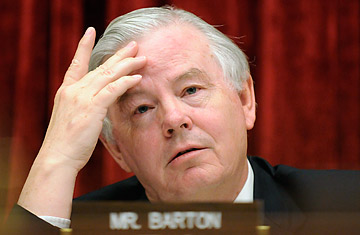
US Representative Joe Barton
In his 26 years in office, energy issues have defined Congressman Joe Barton's career. They've also defined his gaffes, as was evident Thursday when the Fort-Worth area Republican alienated even the members of his own caucus by apologizing to BP CEO Tony Hayward for what he initially called a White House $20 billion "shakedown," only to turn around later in the day and issue an apology for the impolitic apology. Here are eight of Barton's other not-so-finest moments in the limelight.
1. Barton is a long-time denier of global warming. He's called it "a triumph over good sense and science" and in 2007 hearings he told Al Gore , "You're not just off a little. You're totally wrong." In railing against House Speaker Nancy Pelosi's passage of global warming legislation last year, Barton said: "You can't regulate God. Not even the Democratic majority in the U.S. Congress can regulate God."
2. That said, Barton has used the threat of global warming to combat something he hates even more: wind energy. In a 2009 hearing, Barton implied that wind is a "finite resource" and that harnessing it would "slow the winds down" which would "cause the temperature to go up."
3. Where does oil come from? Barton asks Nobel Prize-winning physicist Steven Chu that probing question during an April 2009 Energy Committee hearing in an exchange about the precious resource in Alaska. Chu's answer about plate tectonics, dumbed down so a five-year-old could understand it, is completely lost on a smirking Barton, who later gloats on Twitter, "I seemed to have baffled the Energy Sec with basic question — Where does oil come from." Actually, those watching were the most baffled.
4. During the 2005 energy bill negotiations, Barton earned the nickname "Smokey Joe" from environmental groups for championing MtBE, a gas additive made in his district which turned out to be a highly dangerous water pollutant. Barton wanted a liability shield for all MtBE producers — a move that his own fellow Republicans in the Senate rejected two years in a row. Barton finally caved, allowing the energy bill to pass.
